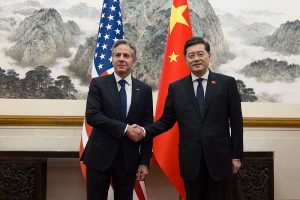Chinese Foreign Minister Qin Gang is unwell and the country’s senior diplomat will take his place at a two-day summit of the Association of Southeast Asian Nations this week in Jakarta, Indonesia, China’s Foreign Ministry said Tuesday.
Foreign Ministry spokesperson Wang Wenbin gave no details of what was ailing Qin, who has not been seen in public in more than two weeks.
“State Councilor and Foreign Minister Qin Gang is unable to attend this series of foreign ministers’ meetings due to health reasons,” Wang said at a daily briefing Tuesday.
Wang Yi, a former foreign minister and the current head of the ruling Communist Party’s Central Commission for Foreign Affairs, will represent China at the meetings Thursday and Friday, Wang Wenbin said.
Wang Yi drew controversy last week with comments saying Westerners are incapable of distinguishing among Chinese, Koreans, and Japanese, and suggesting the three countries with vastly different societies and polities form an alliance based on racial and cultural similarities.
Indonesian Foreign Ministry spokesperson Teuku Faizasyah confirmed that Wang Yi would be attending the ASEAN meeting in Qin’s stead. Wang will attend the China-ASEAN foreign ministers’ meeting, the ASEAN-China-Japan-South Korea foreign ministers’ meeting, the East Asia Summit foreign ministers’ meeting, and the ASEAN Regional Forum foreign ministers’ meeting.
The foreign ministers’ meeting is a “platform to enhance mutual trust and cooperation,” Wang Wenbin told reporters. “China hopes this meeting will help build more consensus, make political preparation for a fruitful ASEAN leaders’ summit in September, and promote regional peace, stability and prosperity.”
Qin, 57, rose to prominence as an outspoken Foreign Ministry spokesperson who popularized an aggressive in-your-face style that came to be known as “wolf warrior diplomacy,” after the name of a nationalistic Chinese movie franchise. He previously served a brief stint as China’s ambassador to the United States for just under a year and a half. Before that, Qin was head of protocol for the ministry, which put him in close contact with China’s top leader Xi Jinping. Qin is viewed as close to Xi, which earned him the promotion to China’s foreign minister despite limited experience with overseas postings.
In March, Qin warned Washington of “conflict and confrontation,” striking a combative tone amid conflicts over Taiwan, COVID-19, and Russia’s invasion of Ukraine. That followed an accusation by Xi that Western governments led by the U.S. wanted to encircle and suppress China.
The “wolf warrior” approach has been adopted by many senior Chinese diplomats, but has also fallen out of favor at times. One of its most famous exponents, former Foreign Ministry spokesperson Zhao Lijian, was transferred in January to a department overseeing land and sea borders in what was widely seen as a demotion.
Current Chinese Ambassador to the U.S. Xie Feng has taken a generally upbeat tone since taking office in May, despite the relationship between the world’s two largest economies hitting a historic low.
Qin’s prolonged disappearance had begun to raise eyebrows even before the latest announcement. According to the Foreign Ministry’s website, Qin’s last public appearance was at a meeting with Sri Lankan Foreign Minister Ali Sabry in Beijing on June 25. On the same day, he also met with Russian Deputy Foreign Minister Rudenko Andrey Yurevich in a previously unannounced visit sparked by the Wagner Group revolt in Russia.
Since then, he has missed meetings with a number of visiting dignitaries, including Xi’s meetings with the prime ministers of New Zealand, Vietnam, and Mongolia in late June. Qin, as foreign minister, would typically be expected to sit in on such events (as he did, for example, when Palestine’s President Mahmoud Abbas visited Beijing on June 14 and Russia’s Prime Minister Mikhail Mishustin visited on May 24).
China watcher Bill Bishop speculated that Qin’s mysterious absence may have been the cause of China’s decision to unilaterally cancel a visit by the EU foreign policy chief, originally scheduled for July 10.
Farther back, on June 2, Qin quietly missed the foreign minsters’ meeting of the BRICS grouping in Cape Town, South Africa. While the other members of the group – Brazil, Russia, India, and South Africa – were represented by their foreign ministers, China sent Vice Foreign Minister Ma Zhouxu to the event. Qin has not traveled abroad in two months, since a tour of Europe from May 8-12.
China’s tightly-controlled, highly opaque political system and the lack of a free press frequently give way to speculation surrounding the disappearance of leading figures, as when former Chinese President Hu Jintao was guided off stage without explanation at the twice-a-decade congress of China’s ruling Communist Party. However, while personal rivalries and scandals over corruption are not uncommon, the party – at least outwardly – remains largely united behind Xi.
































